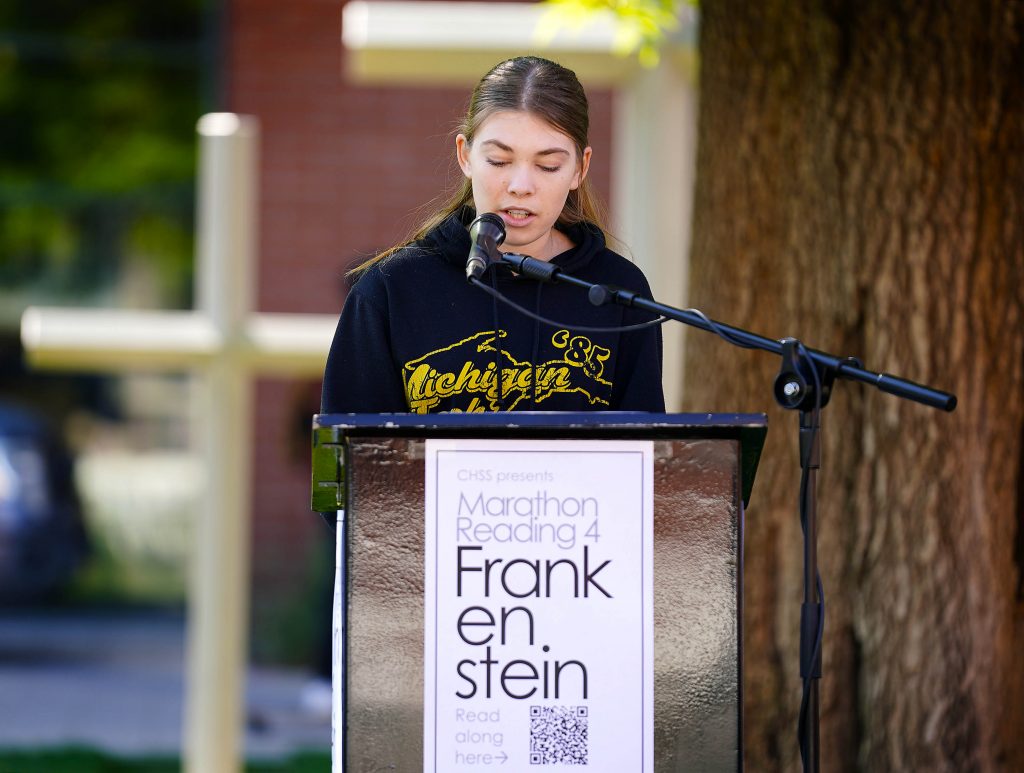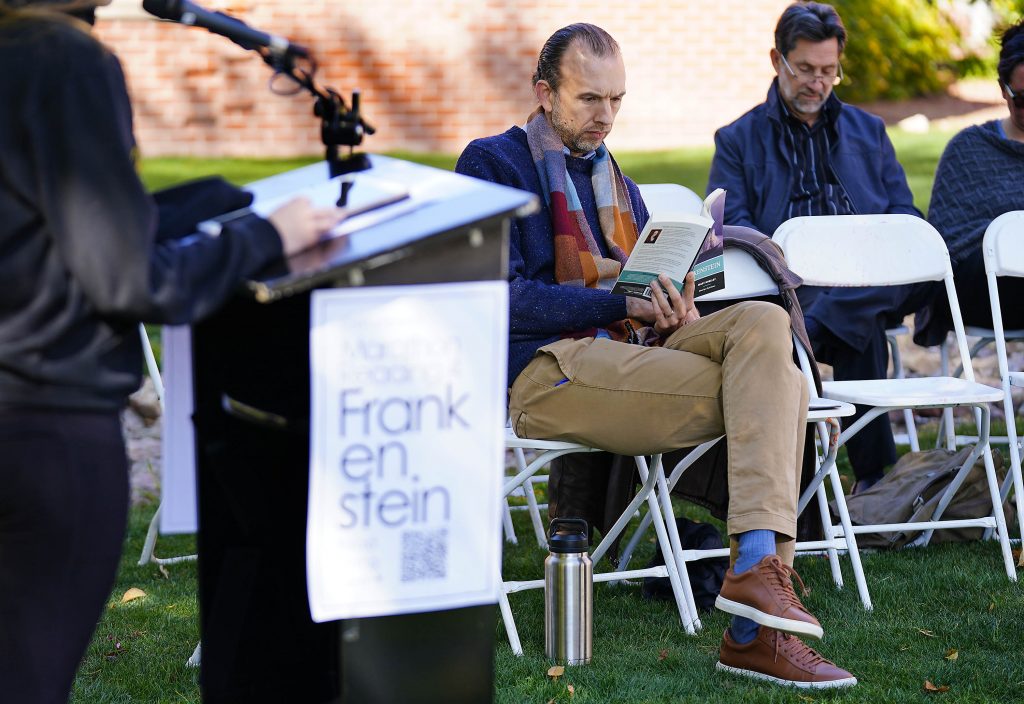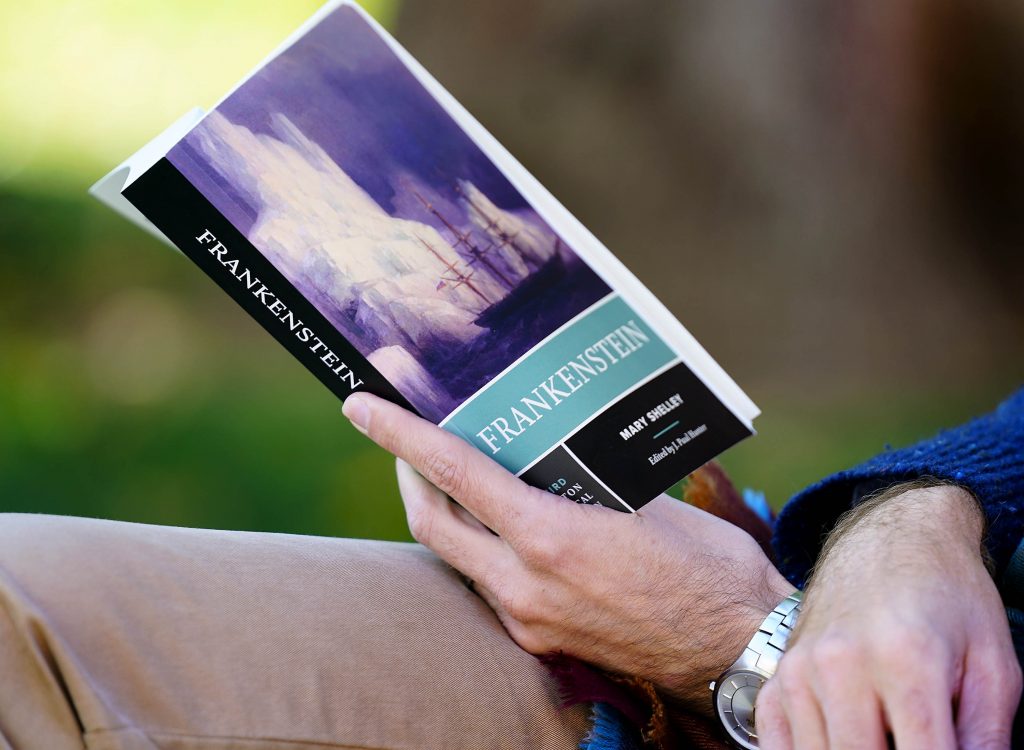
Photos by Ralph Freso
“Remember me with affection, should you never hear from me again. Your affectionate brother, Robert Walton.”
That’s sophomore Anna Howard reading a letter from explorer Robert Walton in the novel “Frankenstein” on Friday under the trees outside GCU Arena.
If that seems odd, you haven’t encountered the passions of an English teacher, in this case Dr. Jonathan Olson, associate professor at Grand Canyon University.
Six years ago, he started a marathon-reading event such as those that occur at other universities but usually under the stark lights of an airless classroom.
“It’s easier to spend a whole day on the grass and in the sun than in a classroom,” said Olson, whose fourth event, Marathon Reading 4: “Frankenstein,” let the prose of author Mary Shelley air out and echo amid skateboard wheels scratching cement from passing students.

It was an event to appreciate literature, even enthusiastically received by engineering, science and business students, not just those from the College of Humanities and Social Sciences.
Howard, a Christian Studies major, learned of it in her English 357 class on British literature with Olson, which opened her eyes to the pleasure in reading books.
“It’s been fun to sit and read something I normally wouldn’t have to time to read on my own, other than what I have to read for my classes,” she said. “So I have been going to the library.”
And she researched the author of “Frankenstein” before reading her part of the 1818 version of the novel. Shelley lost children and her husband, Percy Shelley, “was pretty anti-religious.”
“The physical act of reading? I think it’s taking time,” she said. “In our generation, they are like me, just looking up authors like I did last night, and getting my answer quickly rather than slowing down and fully engaging with what you are reading.”
On Friday, they engaged in reading aloud, more than three dozen students, hour after hour, seven hours to read the novel that holds relevancy two centuries later. The tale of Victor Frankenstein, a scientist who creates a sapient creature in an experiment that goes terribly wrong, always has connected with students for exploring a feeling that you don’t belong.
But one theme is particularly fresh today.
“In the news right now there is a lot of discussion about machine learning and artificial intelligence and how that is going to affect the people who use it as well as how it will affect our society,” Olson said.

The novel uses the ideas of Prometheus stealing fire in Greek mythology, and continues the motif of a fall from grace from a previous marathon reading of Milton’s “Paradise Lost,” to examine our forays into technology and the philosophical and ethical issues it creates.
“It’s sort of evergreen in its application to what we are experiencing,” he said.
Indeed, one could ask ChatGPT, an artificial intelligence language model that is making waves, what the novel had to say about technology and it will spit out this:
“Victor's creation of the monster illustrates the dangers of playing God with technology, as he unleashes a force that he cannot control. This underscores the need for ethical considerations and caution when developing new technologies.”
And yet listeners followed along on the Wikisource version of the text on their phones, which was quite handy, the intriguing prose of the author rhythmically singing from a reading student, Rebecca Mayne.
“Such a strange thing happened to us ...”
It’s a story created from a writer these students’ age more than two centuries ago.
Grand Canyon University senior writer Mike Kilen can be reached at [email protected] or at 602-639-6764.
Related content:



































































